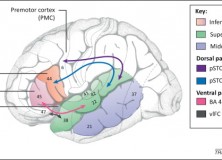UPDATE: This paper is now a Trends in Cognitive Sciences Free Featured Article and is available for free here
Noam Chomsky, who infamously stated that the field of language evolution research is “a burgeoning literature, most of which in my view is total nonsense” (see, e.g. here), has a new paper on the topic in press (together with linguist Robert Berwick and neuroscientists Angela Friederici and Johan Bolhuis) called Evolution, brain, and the nature of language (here, unfortunately it’s behind a paywall).
Here’s the abstract:
Language serves as a cornerstone for human cognition, yet much about its evolution remains puzzling. Recent research on this question parallels Darwin’s attempt to explain both the unity of all species and their diversity. What has emerged from this research is that the unified nature of human language arises from a shared, species-specific computational ability. This ability has identifiable correlates in the brain and has remained fixed since the origin of language approximately 100 thousand years ago. Although songbirds share with humans a vocal imitation learning ability, with a similar underlying neural organization, language is uniquely human.
Also interesting is their figure on the Desing of the language system:
“The basic design of language. There are three components: syntactic rules and representations, which, together with lexical items, constitute the basis of the language system, and two interfaces through which mental expressions are connected to the external world (external sensory-motor interface) and to the internal mental world (internal conceptual-intentional interface).”
This still looks very much like the model advocated in for example, the influential and controversial Hauser/Chomsky/Fitch 2002 Science paper (see e.g. here) and from a brief look through the review. The paper also reiterates the view that language is primary an instrument aiding internal thought, and its use for communication is a later by-product (a view that has been thouroughly criticized, by for example Steven Pinker and Ray Jackendoff, e.g. here):
“communication, an element of externalization, is an ancillary aspect of language, not its key function, as maintained by what is perhaps a majority of scholars (cf. [Jim Hurford, Michael Tomasello], among many others). Rather, language serves primarily as an internal ‘instrument of thought’”



everybody knows now, that when chomsky talks about language he is probably talking about sth else, not the language we use every day to chat and gossip.
Sometimes one might think indeed that Chomsky is talking about something entirely else that everyday language, but in fact the Chomskyan view is that even the most simple everyday utterances such as “He’s eating an apple” have an extremely complex underlying syntactic structure which relies on a uniquely human computational cognitive capacity. As Fitch, Hauser, Chomsky (2005) state: “For many linguists, “language” delineates an abstract core of computational operations, central to language and probably unique to humans. For many biologists and psychologists, “language” has much more general and various meanings,
roughly captured by “the communication system used by human beings.”” And this is sometimes what is causing confusion.
(see also Pinker & Jackendoff on Chomsky’s views: http://pinker.wjh.harvard.edu/articles/papers/2005_09_Jackendoff_Pinker.pdf )
De Saussure once said that linguistics is a science in which theory is prior to the subject of study; and this still holds.
I just did not understand the argument that led up to the claim about communication being an ancillary function of language. Did anybody else? Care to explain?
@thomscottphillips: I thought it was a throwaway remark as well. However, I did come across this post the other day: More on Darwin’s problem. The writer didn’t get it either, but he’s sympathetic to the claim that language might be ancillary to communication — mainly in the sense that it is a byproduct of enhanced cognition.
Thanks for the link James. Interesting read.
Berwick’s just coauthored another paper involving birdsong. Press release here: http://www.stumbleupon.com/su/1uVUQr/http://web.mit.edu/newsoffice/2013/how-human-language-could-have-evolved-from-birdsong-0221.html